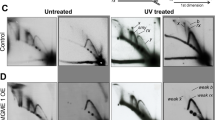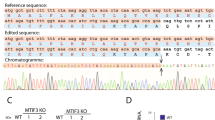Abstract
The physiological roles of the mitochondrial transcription termination factor (mTERF) family are poorly understood. MTERF and its homologues influence transcriptional readthrough in vitro, but the extent to which they regulate mitochondrial RNA levels in vivo is unclear. In addition, MTERF was previously shown to promote replication pausing. To test their roles in mtDNA metabolism, we created cell-lines inducibly expressing epitope-tagged versions of two members of the mTERF family, MTERFD1 and MTERFD3, as well as shRNA constructs targeted at each. We confirmed mitochondrial targeting and lack of sequence-specific DNA binding for both factors. Over-expression of epitope-tagged MTERFD1 or MTERFD3 resulted in modest mtDNA copy-number depletion and an accumulation of specific mtDNA replication intermediates indicating an impairment of the terminal steps of replication. These findings further implicate the mTERF family in restraining replication fork progression and support the idea that they facilitate the orderly passage of replication and transcription machineries, thus contributing to genome stability.




Similar content being viewed by others
References
Asin-Cayuela J, Gustafsson CM (2007) Mitochondrial transcription and its regulation in mammalian cells. Trends Biochem Sci 32:111–117
Falkenberg M, Gaspari M, Rantanen A et al (2002) Mitochondrial transcription factors B1 and B2 activate transcription of human mtDNA. Nat Genet 31:289–294
Sologub M, Litonin D, Anikin M et al (2002) TFB2 is a transient component of the catalytic site of the human mitochondrial RNA polymerase. Cell 139:934–944
Kruse B, Narasimhan N, Attardi G (1989) Termination of transcription in human mitochondria: identification and purification of a DNA binding protein factor that promotes termination. Cell 58:391–397
Fernandez-Silva P, Martinez-Azorin F, Micol V et al (1997) The human mitochondrial transcription termination factor (mTERF) is a multizipper protein but binds to DNA as a monomer, with evidence pointing to intramolecular leucine zipper interactions. EMBO J 16:1066–1079
Martin M, Cho J, Cesare AJ et al (2005) Termination factor-mediated DNA loop between termination and initiation sites drives mitochondrial rRNA synthesis. Cell 123:1227–1240
Daga A, Micol V, Hess D et al (1993) Molecular characterization of the transcription termination factor from human mitochondria. J Biol Chem 268:8123–8130
Christianson TW, Clayton DA (1986) In vitro transcription of human mitochondrial DNA: accurate termination requires a region of DNA sequence that can function bidirectionally. Proc Natl Acad Sci USA 83:6277–6281
Asin-Cayuela J, Schwend T, Farge G et al (2005) The human mitochondrial transcription termination factor (mTERF) is fully active in vitro in the non-phosphorylated form. J Biol Chem 280:25499–25505
Hyvärinen AK, Pohjoismäki JLO, Reyes A et al (2007) The mitochondrial transcription termination factor mTERF modulates replication pausing in human mitochondrial DNA. Nucleic Acids Res 35:6458–6474
Prieto-Martín A, Montoya J, Martínez-Azorín F (2004) New DNA-binding activity of rat mitochondrial transcription termination factor (mTERF). J Biochem 136:825–830
Park CB, Asin-Cayuela J, Camara Y et al (2007) MTERF3 is a negative regulator of mammalian mtDNA transcription. Cell 130:273–285
Wenz T, Luca C, Torraco A et al (2009) mTERF2 regulates oxidative phosphorylation by modulating mtDNA transcription. Cell Metab 9:499–511
Roberti M, Bruni F, Loguercio Polosa P et al (2006) MTERF3, the most conserved member of the mTERF-family, is a modular factor involved in mitochondrial protein synthesis. Biochim Biophys Acta 1757:1199–1206
Pellegrini M, Asin-Cayuela J, Erdjument-Bromage H et al (2009) MTERF2 is a nucleoid component in mammalian mitochondria. Biochim Biophys Acta 1787:296–302
Loguercio Polosa P, Roberti M, Musicco C et al (1999) Cloning and characterisation of mtDBP, a DNA-binding protein which binds two distinct regions of sea urchin mitochondrial DNA. Nucleic Acids Res 27:1890–1899
Fernandez-Silva P, Loguercio Polosa P, Roberti M et al (2001) Sea urchin mtDBP is a two-faced transcription termination factor with a biased polarity depending on the RNA polymerase. Nucleic Acids Res 29:4736–4743
Loguercio Polosa P, Deceglie S, Roberti M et al (2005) Contrahelicase activity of the mitochondrial transcription termination factor mtDBP. Nucleic Acids Res 33:3812–3820
Roberti M, Fernandez-Silva P, Loguercio Polosa P (2005) In vitro transcription termination activity of the Drosophila mitochondrial DNA-binding protein DmTTF. Biochem Biophys Res Commun 331:357–362
Roberti M, Loguercio Polosa P, Bruni F et al (2003) DmTTF, a novel mitochondrial transcription termination factor that recognizes two sequences of Drosophila melanogaster mitochondrial DNA. Nucleic Acids Res 31:1597–1604
Roberti M, Bruni F, Loguercio Polosa P et al (2006) The Drosophila termination factor DmTTF regulates in vivo mitochondrial transcription. Nucleic Acids Res 34:2109–2116
Pohjoismäki JLO, Wanrooij S, Hyvärinen AK et al (2006) Alterations to the expression level of mitochondrial transcription factor A, TFAM, modify the mode of mitochondrial DNA replication in cultured human cells. Nucleic Acids Res 34:5815–5828
Sembongi H, Di Re M, Bokori-Brown M et al (2007) The yeast Holliday junction resolvase, CCE1, can restore wild-type mitochondrial DNA to human cells carrying rearranged mitochondrial DNA. Hum Mol Genet 16:2306–2314
Yonashiro R, Sugiura A, Miyachi M et al (2009) Mitochondrial ubiquitin ligase MITOL ubiquitinates mutant SOD1 and attenuates mutant SOD1-induced reactive oxygen species generation. Mol Biol Cell 20:4524–4530
Larsson NG, Wang J, Wilhelmsson H et al (1998) Mitochondrial transcription factor A is necessary for mtDNA maintenance and embryogenesis in mice. Nat Genet 18:231–236
Hance N, Ekstrand MI, Trifunovic A (2005) Mitochondrial DNA polymerase gamma is essential for mammalian embryogenesis. Hum Mol Genet 14:1775–1783
Cerritelli SM, Frolova EG, Feng C et al (2003) Failure to produce mitochondrial DNA results in embryonic lethality in Rnaseh1 null mice. Mol Cell 11:807–815
Rudolph CJ, Dhillon P, Moore T et al (2007) Avoiding and resolving conflicts between DNA replication and transcription. DNA Repair (Amst) 6:981–993
Linder T, Park CB, Asin-Cayuela J et al (2005) A family of putative transcription termination factors shared amongst metazoans and plants. Curr Genet 48:265–269
Pohjoismäki JLO, Holmes JB, Wood SR et al (2010) Mammalian mitochondrial DNA replication intermediates are essentially duplex but contain extensive tracts of RNA/DNA hybrid. J Mol Biol 397:1144–1155
Yasukawa T, Reyes A, Cluett TJ et al (2006) Replication of vertebrate mitochondrial DNA entails transient ribonucleotide incorporation throughout the lagging strand. EMBO J 25:5358–5371
Acknowledgments
We thank Academy of Finland, Tampere University Hospital Medical Research Fund, the UK Medical Research Council, Sigrid Juselius Foundation and the EU for financial support, Aurelio Reyes, Steffi Goffart and Hans Spelbrink for useful discussions and Outi Kurronen, Merja Jokela and Tea Tuomela for technical assistance.
Author information
Authors and Affiliations
Corresponding author
Electronic supplementary material
Below is the link to the electronic supplementary material.
Rights and permissions
About this article
Cite this article
Hyvärinen, A.K., Pohjoismäki, J.L.O., Holt, I.J. et al. Overexpression of MTERFD1 or MTERFD3 impairs the completion of mitochondrial DNA replication. Mol Biol Rep 38, 1321–1328 (2011). https://doi.org/10.1007/s11033-010-0233-9
Received:
Accepted:
Published:
Issue Date:
DOI: https://doi.org/10.1007/s11033-010-0233-9




